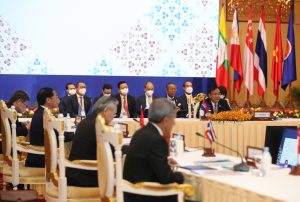The crisis in Myanmar and tensions in the Taiwan Strait have dominated discussions at yesterday’s meeting of the Association of Southeast Asian Nations (ASEAN) foreign ministers in Phnom Penh, the first such in-person meeting since the beginning of the COVID-19 pandemic.
The meeting took place at a troubling juncture in global politics, with tensions over Taiwan, the Russia-Ukraine war, tensions in the South China Sea, and the continued economic lag of the COVID-19 pandemic crowding toward the top of the agenda.
As Cambodian Foreign Minister Prak Sokhonn told the delegates ahead of the meetings, “ASEAN has to deal with challenges of different types and levels but never before, never like this year, have we been confronted at the same time with so many perils for the region and the world at large.”
However, much of the meeting’s attention was absorbed by events closer to home, namely, the worsening situation in Myanmar. The country has been in a state of turmoil since the military seized power in February 2021, inflaming the country’s existing conflicts and spreading them to areas of the country that have not seen fighting for decades.
But yesterday’s meeting came at a time of increasing ASEAN frustration toward Myanmar’s military administration. It took place less than two weeks after the military junta executed four political prisoners, despite a personal plea from Cambodia’s Prime Minister Hun Sen, the current chair of ASEAN. The cruel act, which took place laid bare the junta’s lack of interest in implementing the bloc’s Five-Point Consensus peace plan, into which ASEAN ministers have poured considerable time and diplomatic energy.
In his opening remarks to the meeting, Hun Sen said that member states were “deeply disappointed and disturbed by the execution of those opposition activists, despite the appeals from me and others for the death sentence to be reconsidered for the sake of political dialogue, peace, and reconciliation.” He went on to say that “if more prisoners are to be executed we will be forced to rethink our role vis-a-vis ASEAN’s Five-Point Consensus.”
The Consensus calls (among other things) for an immediate end to violence and inclusive dialogue involving “all parties” to Myanmar’s conflict, but has been hamstrung by its need for the junta’s good faith implementation of the agreement. Malaysia’s Foreign Minister Saifuddin Abdullah, who has been outspoken about the need for ASEAN to toughen its stance toward the junta, said ahead of yesterday’s meeting that given the lack of progress, the bloc should think about scrapping or revising the Consensus, and said that it “will need to make a big decision” at its summit in November.
Following the day’s meetings, Saifuddin told reporters that he had brought up proposals on strengthening the implementation of the Five-Point Consensus and including talks with opposition groups, but that the future of the plan would have to be decided later in the year when ASEAN leaders hold their summit.
“The Five-Point Consensus was decided by the leaders of ASEAN and only the leaders can decide what we do,” he said, according to The Associated Press. Malaysia is reported to be pushing to exclude Myanmar’s junta from all ASEAN meetings, including ministerial meetings, barring implementation of the Consensus, in addition to opening more lines of communication with the opposition National Unity Government. The military regime is currently excluded from high-level summits, and was represented at yesterday’s meeting by an empty chair.
In a draft copy of the final communique of the meeting, which was obtained and excerpted by The Associated Press, the ministers pledged to “accelerate the implementation of the Five-Point Consensus” and again “called for the immediate cessation of violence.” A report by Japan’s Kyodo News suggested that some ASEAN member states are pushing for the inclusion of language stating that the organization “condemns and was strongly disappointed by the executions” and a repeat of an earlier Cambodian statement describing the killings as “highly reprehensible.”
The AMM also discussed a number of international crises, including the negative impact of Russia’s invasion of Ukraine, especially on energy and food prices, and the importance of pushing forward the Code of Conduct on the South China Sea.
But the AMM was overshadowed by tensions in the Taiwan Strait, following U.S. House Speaker Nancy Pelosi’s dramatic visit to Taiwan yesterday, which has infuriated the Chinese government and prompted threats of a military response. In a statement released this morning, a rare single-issue intervention for the bloc, the ASEAN foreign ministers called for calm in the Taiwan Strait, warning that an increase in international and regional volatility could lead to “miscalculation, serious confrontation, open conflicts, and unpredictable consequences among major powers.”
In their statement, the ASEAN foreign ministers called for “maximum restraint” and for all sides to “refrain from provocative action.”
“We should act together and ASEAN stands ready to play a constructive role in facilitating peaceful dialogue between all parties including through utilizing ASEAN-led mechanisms to deescalate tension, to safeguard peace, security and development in our region,” it said.
Both U.S. Secretary of State Antony Blinken and Chinese Foreign Minister Wang Yi are scheduled to take part in ASEAN meetings today and tomorrow, though it is currently unclear whether the two leaders will meet.

































